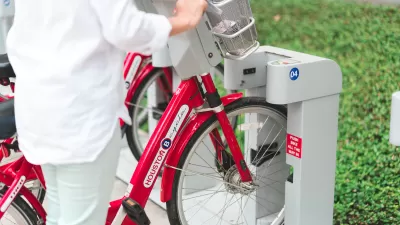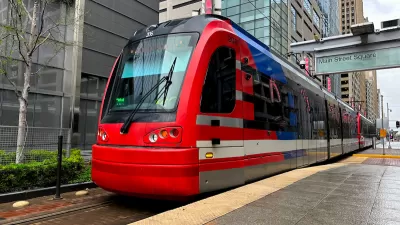A new plan from the city’s transit agency focuses on improving the rider experience and boosting safety, but remains uncommitted to previous plans to build new BRT lines.

Houston’s Metropolitan Transit Authority of Harris County (METRO) unveiled a new plan
focused on reliability, cleanliness, safety, and accessibility that aims to increase ridership and improve the transit experience for users.
The agency’s plan, dubbed METRONow, is a revised version of the city’s prior METRONext plan, explains Dominic Walsh in Houston Public Media. It calls for 350 new buses and the replacement of 100 accessible vehicles, as well as accessibility improvements at bus stops. It includes a $7 million investment in security initiatives such as lighting, fences, and patrols on trains.
The agency previously scrapped bus rapid transit projects, citing cost concerns. Now, some of those projects might move forward under the new plan. However, the agency killed the proposed University Corridor BRT line, which would have linked multiple universities over a 25-mile line. It also demoted a planned BRT line along Interstate 10 to a shared high occupancy vehicle lane.
FULL STORY: Houston transit authority unveils ‘METRONow’ initiative focused on cleanliness, safety and ridership

Maui's Vacation Rental Debate Turns Ugly
Verbal attacks, misinformation campaigns and fistfights plague a high-stakes debate to convert thousands of vacation rentals into long-term housing.

Planetizen Federal Action Tracker
A weekly monitor of how Trump’s orders and actions are impacting planners and planning in America.

In Urban Planning, AI Prompting Could be the New Design Thinking
Creativity has long been key to great urban design. What if we see AI as our new creative partner?

King County Supportive Housing Program Offers Hope for Unhoused Residents
The county is taking a ‘Housing First’ approach that prioritizes getting people into housing, then offering wraparound supportive services.

Researchers Use AI to Get Clearer Picture of US Housing
Analysts are using artificial intelligence to supercharge their research by allowing them to comb through data faster. Though these AI tools can be error prone, they save time and housing researchers are optimistic about the future.

Making Shared Micromobility More Inclusive
Cities and shared mobility system operators can do more to include people with disabilities in planning and operations, per a new report.
Urban Design for Planners 1: Software Tools
This six-course series explores essential urban design concepts using open source software and equips planners with the tools they need to participate fully in the urban design process.
Planning for Universal Design
Learn the tools for implementing Universal Design in planning regulations.
planning NEXT
Appalachian Highlands Housing Partners
Mpact (founded as Rail~Volution)
City of Camden Redevelopment Agency
City of Astoria
City of Portland
City of Laramie





























